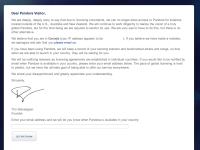Over the past month, Music Canada, the lead lobby group for the Canadian recording industry, has launched a social media campaign criticizing a recent Copyright Board of Canada decision that set some of the fees for Internet music streaming companies such as Pandora. The long-overdue decision seemingly paves the way for new online music services to enter the Canadian market, yet the industry is furious about rates it claims are among the worst in the world.
The Federal Court of Appeal will review the decision, but the industry has managed to get many musicians and music labels worked up over rates it labels 10 percent of nothing. While the Copyright Board has more than its fair share of faults, a closer examination of the Internet music streaming decision suggests that this is not one of them.
The Music Canada claim, which is supported by Re:Sound (the copyright collective that was seeking a tariff or fee for music streaming), is that the Canadian rates are only 10 percent of the equivalent rate in the United States. That has led to suggestions that decision devalues music and imperils artists’ livelihood.
My weekly technology law column (Toronto Star version, homepage version) argues the reality is far more complex.











